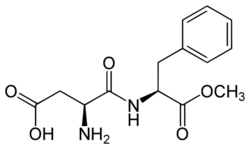Aspartame
(drug) | |
|---|---|
 | |
| Start | 1965 |
| Widely used artificial sweetener with increasingly suspect looking health effects. | |
Aspartame is a drug that was first made in 1965. It is widely used as a sugar-free sweetener worldwide. It has been banned twice by the FDA, but re-legalised. Its safety is a continued subject of debate.
Official narrative
A panel of experts set up by the European Food Safety Authority concluded in 2013 that aspartame is safe for human consumption at current levels of exposure.[1] Evidence does not suggest that aspartame assists in weight loss or diabetes.[2]
History
Aspartame was approved by the FDA in 1974, but after discovery of problems with Searle's safety testing program, including testing of aspartame, approval was rescinded in 1975.
"In January of 1981 Donald Rumsfeld, CEO of Searle, stated in a sales meeting that he was going to “call in his markers” and make a push to get aspartame approved."[3] That month Ronald Reagan was sworn in as US President. His transition team included Rumsfeld who hand picked[better source needed] Dr. Arthur Hull Hayes Jr. to be the new FDA Commissioner. Hayes appointed a 5-person Scientific Commission to review the claims on aspartame, which voted 3 – 2 decision that the artificial sweetener was unsafe. However approval was granted in 1981.[3]
Safety
The safety of aspartame is a matter of research. Wikipedia has a page devoted to the "controversy", which highlights flaws in safety research, suggesting that aspartame use carries a long term health risk.
Strokes, dementia
The Washington Post reported in 2017 that a "new study shows an association between diet soda and both stroke and dementia".[4]
References
- ↑ "Scientific Opinion on the re-evaluation of aspartame (E 951) as a food additive". EFSA Journal. 11 (12): 263. 10 December 2013. doi:10.2903/j.efsa.2013.3496 (inactive 2017-01-28).Page Module:Citation/CS1/styles.css must have content model "Sanitized CSS" for TemplateStyles (current model is "Scribunto").
- ↑ Azad, Meghan B.; Abou-Setta, Ahmed M.; Chauhan, Bhupendrasinh F.; Rabbani, Rasheda; Lys, Justin; Copstein, Leslie; Mann, Amrinder; Jeyaraman, Maya M.; Reid, Ashleigh E.; Fiander, Michelle; MacKay, Dylan S.; McGavock, Jon; Wicklow, Brandy; Zarychanski, Ryan (16 July 2017). "Nonnutritive sweeteners and cardiometabolic health: a systematic review and meta-analysis of randomized controlled trials and prospective cohort studies". Canadian Medical Association Journal. 189 (28): E929–E939. doi:10.1503/cmaj.161390. PMC 5515645. PMID 28716847.Page Module:Citation/CS1/styles.css must have content model "Sanitized CSS" for TemplateStyles (current model is "Scribunto").
- ↑ a b https://dailyhealthpost.com/the-shocking-story-of-how-aspartame-became-legal/
- ↑ https://www.washingtonpost.com/news/morning-mix/wp/2017/04/21/study-links-diet-soda-to-higher-risk-of-stroke-dementia/